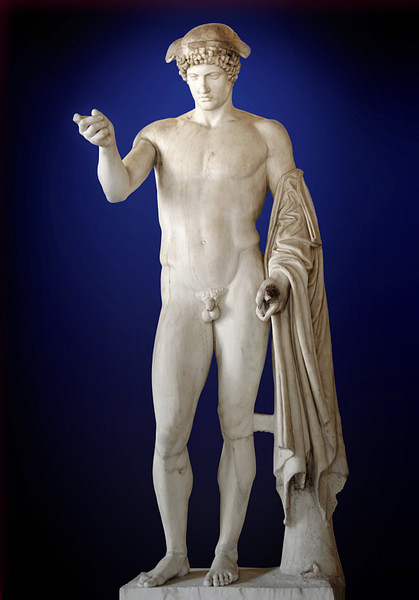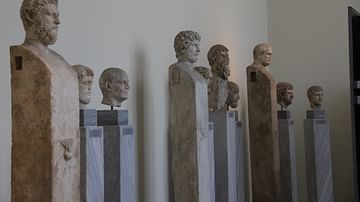
Mercury (Mercurius) was the Roman god of commerce, often serving as a mediator between the gods and mortals, his winged feet giving him the advantage of speed, and so was the patron of circulation in general - of people, goods and messages. Mercury protected both merchants, especially those dealing in grains, and travelers. Merchants would pray to him for high profits and protection of their trade goods. However, to many, he was also known for being cunning and shrewd as well as a deceiver, often pulling pranks on the unsuspecting, especially the god Apollo. Mercury was the son of the king of the gods Jupiter and purportedly Maia, goddess of the plains. Considered by some to be of foreign origin, he is often associated with his Greek counterpart Hermes. His Roman name Mercurius is probably derived from the Latin word for merchandise (merx).
Like Hermes, he escorted the dead to the underworld. Allegedly, while escorting the nymph Lara to Pluto's realm, he fathered the twin Lares, guardian gods of Rome. A temple honoring him was built around 495 BCE and stood on the southwest slope of Aventine Hill near the Circus Maximus of Rome. Mercury's festival day was celebrated on May 15 in commemoration of the founding of his temple. A cult paying homage to him existed outside the city of Rome in Campania and Latium as well as in Gaul and Britain. The god is frequently depicted holding the caduceus, a wand used to reconcile conflicts, and winged sandals for quickly carrying messages for the gods. The wand had been given to him by Apollo in Greek mythology. Besides the wand and sandals, he also wore a broad-brimmed hat, the Petasus, and carried a purse, a symbol of his duties as the god of commerce and profits. Like many of the Roman gods, a planet - the closest one to the sun - was named for him.
Mercury & Jupiter
Roman mythology is replete with stories of Mercury. It was Mercury who was sent to remind the Trojan Aeneas to leave his beloved Queen Dido and Carthage and achieve his destiny to found Rome. Often, however, Jupiter would take Mercury with him on many of his excursions to earth to be among the mortals. According to the Roman poet Ovid in his Metamorphoses, on one of these trips, the two, dressed as peasants, came to a small village where they were dismissed rudely by its inhabitants. However, they knocked on the door of the small home of Baucis and Philemon. Although extremely poor, the couple, unaware of who their guests were, shared what little food and drink they possessed with the weary travelers. They were even willing to kill their only goose. Upon revealing themselves to the old couple, Jupiter wanted to reward them; however, they only had one wish, that they would die together. Even though he destroyed the rest of the village, the king of the gods honored their wishes, but until that day arrived he made them caretakers of a temple he built on the site of their old home.

Mercury the Thief
Besides the god of commerce, Mercury was also the patron of shepherds, cheats and thieves. Ovid relays a story of Mercury who was a master thief himself. A servant named Battus was watching a herd of mares in a pasture when he saw Mercury steal a herd of cattle and drive them into nearby woods. Mercury told Battus if anyone inquired about the missing cattle he should say that he saw nothing. As a reward, the god gave the old man a heifer. Returning later in a disguise, Mercury asked him if he had seen anything. After being promised a heifer and a bull if he talked, the old man revealed all. Angry, Mercury turned him into stone.
Other Adventures
Another time the winged god saved Jupiter from the wrath of his wife, the jealous Hera. While Jupiter was with Io, daughter of the river god Inachus, Mercury warned him of his approaching wife. Immediately, Jupiter changed Io into a heifer. The suspicious Hera placed the poor girl, still in the disguise of a heifer, under the watchful eyes of the many-eyed Argus. In order to free Io Mercury told Argus boring stories until he finally fell asleep. After Mercury beheaded Argus, Io was freed.
As with many stories in Roman mythology, narratives about Mercury became intertwined with those of Hermes, so it is often difficult to separate the two. One story, more often associated with Hermes, concerns Demeter and her daughter Persephone. In Roman Mythology it is Mercury who escorts the young Proserpina, daughter of Ceres, to the underworld to be with Pluto (the Greek Hades).
One last story tells of the adventuresome Mercury as a small child - again it is an episode more often attributed to Hermes. Although a talented child - he built a lyre out of a tortoiseshell - one night he slipped away from his mother and, spying Apollo's oxen grazing in a field, stole them. After eating two of them, Mercury returned to his mother. Upon finding his oxen missing and seeing how two of them had been eaten, Apollo realized who was the culprit and took the infant to Mt. Olympus where he was found guilty. Mercury was then forced to return the oxen and he gave his lyre to Apollo to replace the missing oxen.







